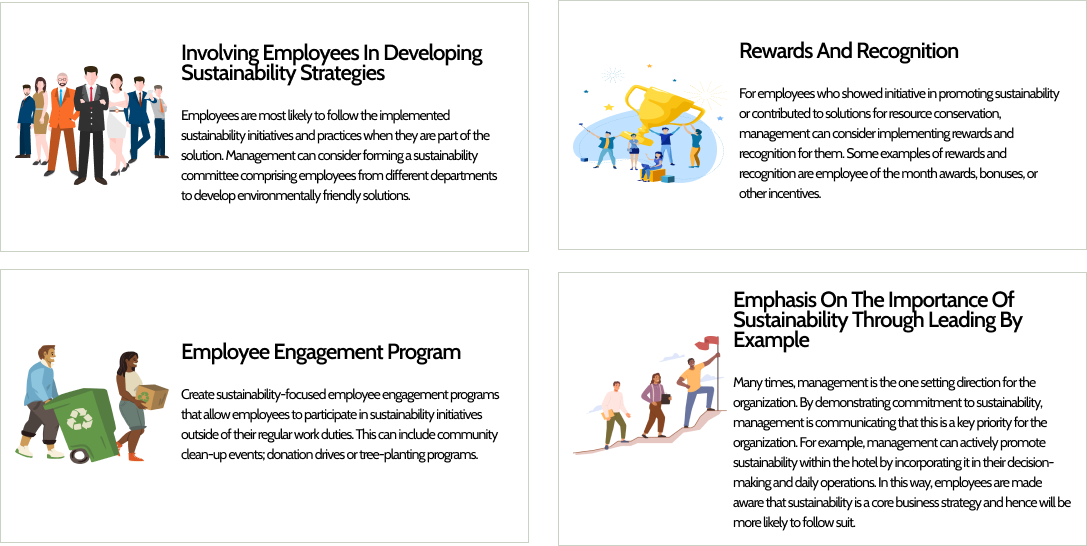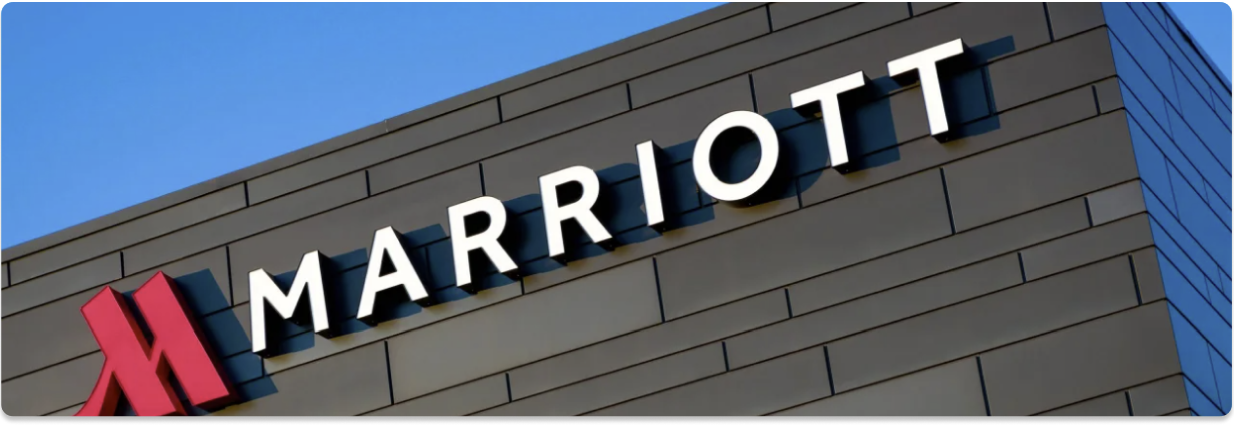
Introduction to Employee Engagement
Employee management is a critical aspect of hotel operations and plays a vital role in promoting and protecting a hotel's branding. This is particularly important for the hospitality industry, where customer satisfaction is paramount. Employee behavior and attitude can have a significant impact on the guests' experience. Therefore, it is essential to have a well-planned and executed employee management strategy that aligns with the hotel's branding and values.
Increasingly, hotels are embracing sustainability in their business strategy and establishing policies and best practices on sustainability. However, these efforts would be wasted if employees do not comply or put them into action. It is of great importance that hotel management ensures that their employees understand and engage in sustainability, as this is crucial to the success of any sustainable initiative.
However, there might be obstacles that prevent employees from engaging in sustainability practices. Some common obstacles could be lack of knowledge and awareness, limited resources and resistance to change.

To overcome the issue, our recommended strategy is one that involves understanding employees' expectations and concerns, effective communication, awareness raising and education, as well as providing sustainable options and incentives. Good employee management can help to cultivate a culture of sustainability amongst their employees that not only benefits the environment but also enhances the hotel's branding and reputation.
Global Best Practices
Understanding employees’ knowledge levels on sustainability
Hotels can gain valuable insights into their employees’ knowledge of sustainable practices via employee engagement surveys. With the information collected, hotels can then better understand the employees’ point of view and make data-driven decisions on sustainable education and strategies.
Armed with this new knowledge, hotels will be able to further develop and implement sustainable strategies such as providing more information on sustainable practices or educating employees about sustainability.


Solutions
Based on the earlier employees’ engagement results, hotels will be able to gain a better understanding of their employees’ level of understanding, expectations and concerns. These findings will provide valuable insights for management to identify any gaps in the current employee engagement strategies and target their efforts towards finding effective solutions.
Here are some of the common initiatives that can encourage and engage employees in sustainability practices:

Education
Case Studies
International
Marriot International, Inc - Employee Engagement Program

Marriott International is a global hospitality company with a strong commitment to sustainability and social impact. The company has launched its 2025 Sustainability and Social Impact Goals, which outline Marriott's efforts to create a positive and sustainable impact on the environment. One of the key objectives of these goals is to reduce waste-to-landfill by 45% and food waste by 50% from a 2016 baseline. To achieve this goal, Marriott recognizes the importance of partnerships across the organization, particularly with employees.
Employee training is one of the most effective ways to support Marriott's progress towards its waste reduction objectives. Marriott hotels worldwide have conducted training programs to support their goals. For example, regional teams in Europe, the Middle East, Africa, and the Asia Pacific have conducted educational webinars to inform culinarians and their employees about global food waste issues, including how to begin or improve food waste reduction programs.
Moreover, the Renaissance Cancun Resort & Marina in Cancun, Mexico, conducted training on the property's Waste Management Plan in 2021. This training showcased the progress of existing strategies and actions and introduced proposals to further improve waste collection, compaction, storage, and disposal. These training programs aim to promote responsible waste management practices among employees and support Marriott's sustainability and social impact goals.
To further promote responsible sourcing, Marriott has implemented training programs for associates with procurement and purchasing responsibilities. Marriott's employees are required to complete the Procurement 101 online training, which includes information on the company's human rights policies. Marriott has also developed guidance and tools to educate employees about responsible sourcing.
Marriott's training programs and resources have been instrumental in raising awareness among employees about the importance of sustainability and responsible sourcing. By promoting sustainability throughout its operations, Marriott is setting a positive example for the hospitality industry and demonstrating its commitment to a better future. With the help of its employees, Marriott can continue to make significant progress towards its sustainability and social impact goals.
Reference: 2022 Serve 360 Report: Environmental, Social, and Governance Progress (marriott.com)
Four Seasons Hotels and Resorts - Employee Engagement Program

The Environmental, Social, and Governance (ESG) program at Four Seasons, also know as Four Seasons for Good, is powered by committed corporate leadership as well as active engagement across the company’s portfolio of hotels, resorts, and residences. Four Seasons has a dedicated corporate ESG team focused on implementing the company’s ESG strategy, setting ambitious long-term goals and guiding the company's progress. The ESG team works closely with several working groups comprised of departmental leaders to inform the ESG strategy’s progress and implementation. All Four Seasons hotels and resorts have on-site teams known as Four Seasons for Good teams. These teams include designated members of property leadership as well as volunteers who are passionate about environmental and social topics. The Four Seasons for Good teams are responsible for: • Driving ESG progress and achieving their hotel or resort’s ESG goals • Implementing Four Seasons ESG objectives in locally relevant ways • Sharing best practices with peers across the Four Seasons portfolio • Engaging colleagues to facilitate learning, identifying areas for enhancement and advancing project initiatives • Celebrating successes and helping to keep colleagues connected to the shared ESG strategy By establishing a strong ESG governance structure that is activated at the property level, Four Seasons is positioned to successfully drive its ESG strategy as the company works towards achieving its sustainability objectives. Four Seasons 2022 Environmental, Social and Governance (ESG) ReportT
Local
Mandarin Oriental Singapore - Textile Recycling Drive

Mandarin Oriental, Singapore, partnered with local NGO Green Square for an internal Textile Recycling Drive. The goal was to redirect textile waste from general waste and contribute to society. Colleagues were encouraged to bring unwanted textiles like clothes, shoes, linens, and accessories to a designated collection point.
Green Square sorted the textiles into usable and non-usable categories. Usable ones were repurposed to developing countries, while non-usable materials were sent to recycling facilities. This initiative resulted in a generous donation of 100kg of textiles, significantly reducing textile waste.
By diverting this amount from the general waste, the hotel lessened its environmental footprint and supported sustainable development in developing nations. Additionally, this drive raised awareness amongst employees and demonstrated the hotel's commitment to sustainability, providing a meaningful way to give back to society.
Monitor & Review
Monitoring employee engagement is essential in measuring how receptive employees are towards the hotel’s sustainable initiatives and gaining an understanding of how effective the engagement strategies are. This allows hotels to have an assessment of their current employee engagement level.
There are several ways to monitor employees’ engagement. One approach is to monitor the attendance rate for employee’s participation in sustainability events. Hotels can monitor employee participation rates in sustainability events such as recycling campaigns, energy conservation workshops, or other sustainability-focused activities. The attendance rate can provide insight into the level of interest and commitment employees have towards the hotel's sustainability efforts.
Another approach is monitoring the results from ongoing employee engagement surveys. These surveys can help identify areas of improvement and provide valuable feedback on the effectiveness of current engagement strategies.
Overall, monitoring employee engagement is a crucial step in building a sustainable culture within the hotel and achieving long-term sustainability goals. By monitoring employee engagement, hotels can identify possible gaps in their engagement strategies and take corrective action to improve their sustainability initiatives.
